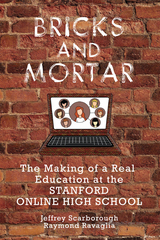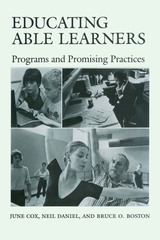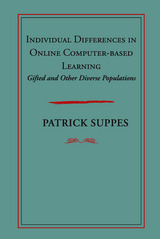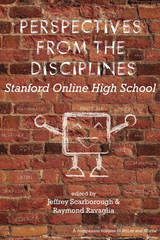
This volume shows how a group of online-learning believers built the best high school in the world without laying a single brick: the Stanford Online High School (SOHS). By chronicling SOHS’s distinctive approach to curriculum, gifted education, and school community over SOHS’s first seven years, Bricks and Mortar makes the case that the dynamic use of technology and the best traditional methodologies in education are not, in fact, mutually exclusive. Indeed, while SOHS has redefined what is possible online, a great education is ultimately the product of an interactive community of teachers and students.

American education has long been under a microscope. In a time when all aspects of our school system face close scrutiny, educators, administrators, and parents are asking critical questions about how we educate those superior students we call “able learners.”
Our schools reward behavior inappropriate for an independent thinker, researcher, or artist. Programming for our most capable students is fragmented and discontinuous. And yet there are schools and programs that hold significant promise.
This four-year national study from the Sid W. Richardson Foundation provides a broad database, looks into the backgrounds of a few unusually creative individuals, and examines programs with a record of success. It argues in favor of comprehensive programming for able learners, providing a steady challenge for all students, helping to insure that no individual talent withers for want of opportunity. Included are recommendations for discovering and nurturing talent in students (including traditionally neglected groups, the economically disadvantaged, and the culturally diverse), building and administering sound programs, developing appropriately trained staff and teachers, and evaluating effectiveness of programs to assure accountability and add credibility.
Compiling data from diverse sources—including 35 MacArthur Foundation Fellows, 400 schools, 1,172 school districts, and countless school personnel and students—the study looks at programs for able learners throughout the country, from Project Pegasus in Iowa to Oaks Academy in Texas, from Bronx High School of Science in New York to Bishop Carroll High School in Alberta, Canada. The authors’ conclusions based on this broad investigation provide an impassioned call for coordinated schooling and cooperation among all segments of society to develop a new generation of creative, self-motivated students.



READERS
Browse our collection.
PUBLISHERS
See BiblioVault's publisher services.
STUDENT SERVICES
Files for college accessibility offices.
UChicago Accessibility Resources
home | accessibility | search | about | contact us
BiblioVault ® 2001 - 2024
The University of Chicago Press









